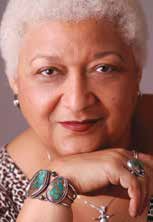
By Jewelle Gomez–
In 1991 my friend and noted film critic, B. Ruby Rich, returned from a film festival and cornered me to say she’d seen an extraordinary film and urged me to see it as soon as it opened. I went immediately to see Thelma and Louise. Watching it was like lighting a fuse under my social conscience that had lain dormant too long.
Recently I watched a documentary about Geena Davis (the aforementioned “Thelma”) at the Institute on Gender in Media ( https://seejane.org ) and its report on the inequity that continues in hiring in all aspects of Hollywood as well as the woeful imbalance in palatable female images for kids. The Institute’s motto, “If she can see it, she can be it,” puts the important Bechdel Test (identified by Lesbian cartoonist, Alison Bechdel) to good use, reminding women and girls that film and television images remain a tragic distortion of who we are in the real world.
After the documentary I re-watched Thelma and Louise to see if it was still as poignant and explosive both politically and personally. More than thirty years later it is! In the guise of a road/buddy movie it celebrates the friendship between women, which usually gets subsumed under female yearning for romance. It also allows for the kind of emotional release that women rarely get. When Louise pulls a gun on a would-be rapist, she’s standing in for every woman who’s been raped; every woman who’s been humiliated by harassment on the street, on public transportation or at work; every woman who’s been beaten by a boyfriend or husband; every woman who’s been ignored in staff meetings. And that’s a lot of women!

Callie Khouri’s funny, emotionally resonant script is amplified by the direction of Ridley Scott, who helped define an earlier feminist hero: Sigourney Weaver as Ridley in Alien (1979). When the ineffable Susan Sarandon and genius (literally) Geena Davis kiss each other as they reach the end of their road, every lesbian and non-lesbian feels the joy of unbreakable friendship swelling inside ourselves, thrilled to have it recognized on screen. The same exhilaration swept through me in this century as it did last century: seeing ourselves makes being ourselves more easily possible.
There’s another film, a vampire classic, that has always excited me in a similar way, Sweden’s Let the Right One In (2008). The thrilling story makes visible ideals that are too often maligned by the larger culture. The stage version at Berkeley Repertory Theatre is no less compelling (https://tinyurl.com/yvumzv3u). The script and staging portray unremitting friendship and love regardless of gender presentation, values that are today constantly threatened by U.S. governmental representatives and far-right activists.
The primary characters are the young Oskar (played on stage by Diego Lucano) who is bullied at school and the seemingly young Eli (played by Noah Lamanna) who is also seemingly a girl, at least to Oskar. Of course, as the story unfolds it’s clear Eli is neither young nor necessarily a girl. The challenge for each of them is to see into the heart of the other and not allow what they see and feel to be limited by society’s strictures on who they are and whom they love.
There are many amazing things to focus on in this production, but the set is emblematic of so much. It’s a grove of white birch trees, on which characters may climb and perch; immediately it’s clear how the world, like a forest, needs disparate individuals in order to make up a cohesive whole. At the center of this forest sits a battered, metal trunk that magically contains everything one might need. During scene shifts the trunk lowers below stage, leaving its rectangular footprint to remind us of what is missing and what is to come. Ultimately, Eli and Oskar (just like us) must rely on each other to survive.
Thelma and Louise begins with a road trip; Let the Right One In ends with a road trip. In each case, it is always in pursuit of seeing and being an authentic self.
Jewelle Gomez is a lesbian/feminist activist, novelist, poet, and playwright. She’s written for “The Advocate,” “Ms. Magazine,” “Black Scholar,” “The San Francisco Chronicle,” “The New York Times,” and “The Village Voice.” Follow her on Instagram and Twitter @VampyreVamp
Leave Signs
Published on June 8, 2023
Recent Comments